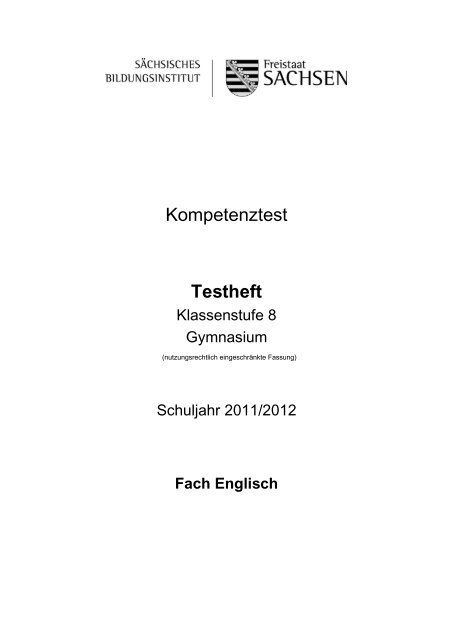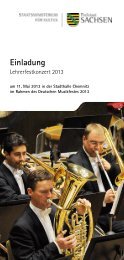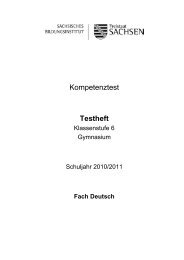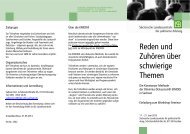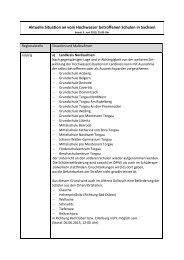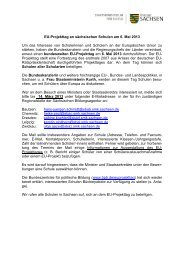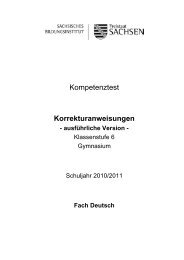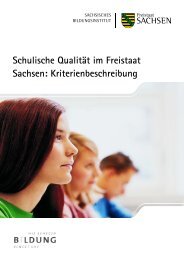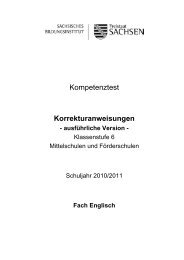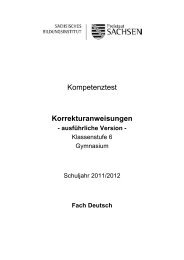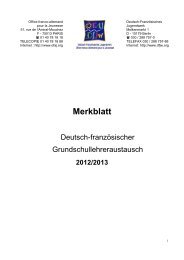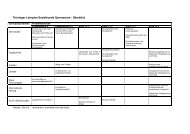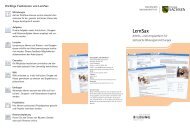Kompetenztest Testheft - Bildung
Kompetenztest Testheft - Bildung
Kompetenztest Testheft - Bildung
You also want an ePaper? Increase the reach of your titles
YUMPU automatically turns print PDFs into web optimized ePapers that Google loves.
<strong>Kompetenztest</strong><br />
<strong>Testheft</strong><br />
Klassenstufe 8<br />
Gymnasium<br />
Schuljahr 2011/2012<br />
Fach Englisch
Anleitung<br />
Liebe Schülerin, lieber Schüler, in diesem <strong>Testheft</strong> findest du Aufgaben zum Hör- und<br />
Leseverstehen im Fach Englisch.<br />
Du wirst verschiedene Aufgaben bearbeiten. Einige davon sind leicht, andere sind schwer.<br />
Gib bitte für alle Aufgaben eine Lösung an, auch wenn du dir nicht ganz sicher bist.<br />
Wenn du deine Antwort auf eine Frage ändern möchtest, sorge bitte dafür, dass die<br />
Korrektur eindeutig ist.<br />
Beispiel:<br />
a)<br />
b)<br />
c)<br />
d)<br />
tired<br />
happy<br />
nervous<br />
funny<br />
Good luck.<br />
1
Hören<br />
Es folgen jetzt Aufgaben zum Hörverstehen.<br />
Auf der CD sind die Arbeitsanweisungen und Hörtexte zu den Aufgaben im <strong>Testheft</strong>. Lies<br />
die Anweisungen und den Aufgabentext sehr genau. Falls Bilder vorhanden sind, schaue<br />
dir auch diese genau an.<br />
Bearbeite die Aufgaben während des Hörens. Wird ein Text zweimal abgespielt, so hast<br />
du nach dem ersten Hören noch 5 bis 20 Sekunden Zeit für die Bearbeitung. Vor dem<br />
zweiten Abspielen hörst du dann einen Piepton.<br />
Schreibe deine Lösung nur in die dafür vorgesehenen Felder. Gib bitte immer eine Lösung<br />
an, auch wenn du dir nicht ganz sicher bist. Nutze die Zeit nach dem Hören, um deine<br />
Lösungen zu vervollständigen und zu prüfen.<br />
2
1 Communication<br />
Listen to the following conversation. While listening, complete the table<br />
below using 1 to 5 words/numbers. There is an example at the beginning<br />
(0).<br />
You will hear the recording only once.<br />
You will have 15 seconds at the end of the recording to complete your<br />
answers.<br />
You now have 20 seconds to look at the task.<br />
audio: © IQB<br />
man<br />
woman<br />
How they communicate (0) letters<br />
(1)<br />
What is good about it handwriting,<br />
(2)<br />
more personal<br />
How people can see<br />
where someone has<br />
been<br />
sends postcards<br />
(3)<br />
3
2 First Job<br />
Listen to Andrew speaking about his first job. While listening, answer the<br />
questions below using 1 to 5 words/numbers. There is an example at the<br />
beginning (0).<br />
You will hear the recording only once.<br />
You will have 15 seconds at the end of the recording to complete your<br />
answers.<br />
You now have 20 seconds to look at the questions.<br />
audio: © IQB<br />
0. When did Andrew start the job?<br />
? 2002<br />
1. Where did he work?<br />
?<br />
2. What did he want to use the money for?<br />
?<br />
3. What did he like about his job?<br />
?<br />
4. What didn't he like?<br />
?<br />
4
3 Green Tips<br />
Listen to three tips. While listening, match each of them with one of the<br />
headings (a to e). You can use each heading only once. There are two<br />
more headings than you need. There is an example at the beginning<br />
(Tip 1).<br />
You will hear the recording only once.<br />
You will have 10 seconds at the end of the recording to complete your<br />
answers.<br />
You now have 20 seconds to look at the task.<br />
source: www.epa.gov/earthday/podcasts (15.07.2010)<br />
a) Travel green!<br />
b) Save electricity!<br />
c) Use eco-friendly energy!<br />
d) Use less water!<br />
Tip 1 Tip 2 Tip 3<br />
e<br />
e) Drive less!<br />
5
4 The Ashes<br />
Listen to an American radio report. While listening, answer the questions<br />
below in 1 to 5 words/numbers. There is an example at the beginning (0).<br />
You will hear the recording twice.<br />
You will have 20 seconds at the end of the recording to complete your<br />
answers.<br />
You now have 30 seconds to look at the task.<br />
source: "England Wins Ashes Tournament In Australia (07.01.2011)"; http://www.npr.org/player/v2/<br />
mediaPlayer.html?action=1&t=1&islist=false&id=132729251&m=132729277 © npr<br />
0. Why are many British people more worn out at this time of year?<br />
? have spent nights watching TV<br />
1. What are the Ashes?<br />
?<br />
2. How long can the Ashes last?<br />
?<br />
3. What is said about the Australian team? (Name one characteristic.)<br />
?<br />
4. Which team won?<br />
?<br />
6
5 India<br />
Listen to a radio programme about India and tick<br />
(a, b, c or d).<br />
You will hear the recording twice.<br />
the correct answer<br />
You will have 20 seconds at the end of the recording to complete your<br />
answer.<br />
You now have 15 seconds to look at the task.<br />
source: http://www.whro.org/home/publicradio/whrv/localprogramming/discoverynow/ (15.04.2009)<br />
Choose the best heading for the programme:<br />
a) Plans for space exploration and travelling to the moon<br />
b) The fast development of the entertainment industry<br />
c) Building a hi-tech centre for education and entertainment<br />
d) Applying to educational institutes in the city of Pune<br />
7
6 Interview<br />
Listen to an interview about Anton's class trip. While listening, answer the<br />
questions below using 1 to 5 words/numbers. There is an example at the<br />
beginning (0).<br />
You will hear the recording only once.<br />
You will have 30 seconds at the end of the recording to complete your<br />
answers.<br />
You now have 20 seconds to look at the questions.<br />
audio: © IQB<br />
0. When did Anton go on a class trip?<br />
? beginning of spring<br />
1. Where did they go?<br />
?<br />
2. What was the weather like?<br />
?<br />
3. Who went there?<br />
?<br />
4. When did they get up?<br />
?<br />
5. What did Anton do during the class trip? (Name two examples.)<br />
? a)<br />
b)<br />
6. What advice does he give?<br />
?<br />
8
7 Britishness<br />
Listen to Daniel’s talk on what it means to be British. While listening,<br />
tick the correct answer (a, b or c). There is an example at the beginning<br />
(0).<br />
You will hear the recording only once.<br />
You will have 20 seconds at the end of the recording to complete your<br />
answers.<br />
You now have 30 seconds to look at the task.<br />
audio: © IQB<br />
0. British people seem to suffer from a loss of<br />
a) international respect.<br />
b) political influence in the world.<br />
<br />
c) national self-image.<br />
1. Daniel is proud of being British because his people<br />
a) welcome people from other countries.<br />
b) have many family members in different states.<br />
c) are on good terms with their former colonies.<br />
2. The British regard themselves as being<br />
a) an independent country.<br />
b) a part of Europe.<br />
c) an Americanized nation.<br />
9
Lesen<br />
Es folgen jetzt Aufgaben zum Leseverstehen.<br />
Im <strong>Testheft</strong> findest du verschiedene Texte. Lies die Arbeitsanweisungen zu jedem Text<br />
genau durch. Dann lies die Texte so, wie es die jeweilige Aufgabenstellung erfordert, und<br />
bearbeite die Aufgaben.<br />
Schreibe deine Antworten nur in die dafür vorgesehenen Felder. Gib bitte immer eine<br />
Lösung an, auch wenn du dir nicht ganz sicher bist. Wenn du noch Zeit hast, überprüfe<br />
deine Lösungen.<br />
Du hast für die folgenden Leseaufgaben 20 Minuten Zeit.<br />
10
8 Mobile Phone Ownership<br />
Who has a mobile phone?<br />
Among teens, age is the most important variable in mobile phone ownership.<br />
Older teens are much more likely to own phones than younger teens, and the<br />
largest increase occurs at age (0) right at the transition between middle and<br />
high school. Among 12 year olds, (1) had a cell phone in 2008. Mobile<br />
phone ownership jumped to (2) at age 14, and by the age of (3) more<br />
than eight in ten teens (84%) had their own cell phone.<br />
0<br />
1 2 3<br />
14<br />
11
9 Boom<br />
Read the text about cell phone use among American teenagers. Then<br />
decide if the statements are true, false or not given in the text. Tick <br />
the correct box. There is an example at the beginning (0).<br />
Boom in texts among US teenagers<br />
Texting has become the most popular form of communication among young<br />
people in the US, research indicates.<br />
The study, by the Pew Internet and American Life Project, suggests that texting<br />
has eclipsed mobile phone calls among teenagers for the first time.<br />
More than 30% of teens send more than 100 texts a day, it shows.<br />
Researchers say more payment plans offering unlimited texts have helped to<br />
create the surge in the US, which used to lag other parts of the world.<br />
The study found that two-thirds of teenagers are now more likely to text their<br />
friends than call them on the phone.<br />
Girls on average send or receive more texts than boys – 80 messages per day<br />
compared to 30.<br />
"Texting is now the central hub of communication in the lives of teens today,<br />
and it has really skyrocketed in the last 18 months," said Amanda Lenhart, a coauthor<br />
of the report.<br />
The study's authors said teenagers preferred texting to phone calls because it<br />
could be carried out under the noses of parents, teachers or other authority<br />
figures.<br />
However, the study found that phone calls are still teenagers' preferred method<br />
for contacting their parents.<br />
source: 'Texting eclipses calling' among US teenagers. (20.04.2010)<br />
0. The study shows that 75% of 12-to<br />
17-year-olds have cell phones.<br />
true false not given<br />
<br />
1. Most US teens prefer phoning to<br />
texting.<br />
2. Boys are more active texters than<br />
their female counterparts.<br />
3. Teens love the multimedia<br />
applications their phones provide.<br />
4. Teens like texting because it can<br />
be done secretively.<br />
12
10 Golden Gate Bridge<br />
Facts about the Golden Gate Bridge<br />
0. Year construction started<br />
1933<br />
1. Year of opening to pedestrian traffic<br />
2. Building costs<br />
3. Number of towers<br />
4. Height of towers<br />
5. Number of main cables<br />
6. Intervals between steel ropes<br />
7. Connecting link on U.S. Highway<br />
11 Northwick Park<br />
The sign says that<br />
a) there is a footpath around the golf course.<br />
b) you are not allowed to walk in this area.<br />
c) there is a less dangerous footpath.<br />
d) you are not allowed to cross the golf course.<br />
13
12 TV Journal<br />
a) Information isn't only on TV.<br />
b) Educational TV is allowed.<br />
c) No TV means no more junk food.<br />
d) There's more time to read.<br />
e) It is possible to live without TV.<br />
f) Parents can help to keep you away from TV.<br />
g) Even meals can be TV-free.<br />
h) Boys can be boring without TV.<br />
i) There's more time for class papers.<br />
0<br />
1 2 3 4 5 6<br />
f<br />
14
Hören<br />
Es folgen jetzt Aufgaben zum Hörverstehen.<br />
Auf der CD sind die Arbeitsanweisungen und Hörtexte zu den Aufgaben im <strong>Testheft</strong>. Lies<br />
die Anweisungen und den Aufgabentext sehr genau. Falls Bilder vorhanden sind, schaue<br />
dir auch diese genau an.<br />
Bearbeite die Aufgaben während des Hörens. Wird ein Text zweimal abgespielt, so hast<br />
du nach dem ersten Hören noch 5 bis 20 Sekunden Zeit für die Bearbeitung. Vor dem<br />
zweiten Abspielen hörst du dann einen Piepton.<br />
Schreibe deine Lösung nur in die dafür vorgesehenen Felder. Gib bitte immer eine Lösung<br />
an, auch wenn du dir nicht ganz sicher bist. Nutze die Zeit nach dem Hören, um deine<br />
Lösungen zu vervollständigen und zu prüfen.<br />
15
13 Kimane Maruge<br />
Listen to a radio report about schools in Kenya. While listening, answer<br />
the questions below using 1 to 5 words. There is an example at the<br />
beginning (0).<br />
You will hear the recording twice.<br />
You will have 15 seconds at the end of the recording to complete your<br />
answers.<br />
You now have 10 seconds to look at the questions.<br />
source: http://www.worldvision.org/worldvision/radio.nsf/c765605ca630d1da87256dbf00644274/<br />
102c5aeb95ab451788256f51007c1483 (02.10.2010)<br />
0. Why do a lot of poor children never go to school?<br />
? parents have to pay for school<br />
1. Why is the situation in Kenya better?<br />
?<br />
2. In what way is Kimane Maruge different from the other pupils?<br />
?<br />
3. What are Kimane Maruge’s future plans?<br />
?<br />
16
14 School Project<br />
Listen to a broadcast about a school project. While listening, answer the<br />
questions below using 1 to 5 words/numbers. There is an example at the<br />
beginning (0).<br />
You will hear the recording only once.<br />
You will have 30 seconds at the end of the recording to complete your<br />
answers.<br />
You now have 20 seconds to look at the task.<br />
audio: © BBC News at bbc.co.uk/news<br />
0. What do the pupils do?<br />
? write reports<br />
1. How many schools have participated?<br />
?<br />
2. What are the pupils expected to learn?<br />
?<br />
3. Who teaches them?<br />
?<br />
17
15 Traffic Light<br />
Listen to an Australian radio programme about the new traffic light food<br />
labelling system. While listening, complete the sentences below using 1<br />
to 5 words. There is an example at the beginning (0).<br />
You will hear the recording twice.<br />
You will have 20 seconds at the end of the recording to complete your<br />
answers.<br />
You now have 20 seconds to look at the task.<br />
audio: Reproduced by permission of the Australian Broadcasting Corporation and ABC Online. © 2011 ABC.<br />
All rights reserved.<br />
0. The new system helps consumers to<br />
? choose the right food.<br />
1. The food industry is concerned about<br />
?<br />
2. The red label means<br />
?<br />
3. According to Jane Martin, the new system is<br />
?<br />
4. Kate Carnell is against the system because<br />
?<br />
18
16 Sailing<br />
Listen to a radio programme about sailing. While listening, answer the<br />
questions below using 1 to 5 words. There is an example at the beginning<br />
(0).<br />
You will hear the recording twice.<br />
You will have 20 seconds at the end of the recording to complete your<br />
answers.<br />
You now have 20 seconds to look at the questions.<br />
audio: © 2011 Living on Earth. Used with permission of Living on Earth and World Media Foundation.<br />
www.loe.org Living on Earth is the weekly environmental news and information program distributed by Public<br />
Radio International. Use of material does not imply endorsement.<br />
0. Who can take part in "Courageous Sailing"?<br />
? inner city kids<br />
1. How much do the kids have to pay?<br />
?<br />
2. How did the kids change during this project?<br />
?<br />
3. What did Gabriela become aware of?<br />
?<br />
19
17 Data Centres<br />
Listen to a radio programme about data centres. While listening, complete<br />
the notes below using 1 to 5 words. There is an example at the beginning<br />
(0).<br />
You will hear the recording twice.<br />
You will have 30 seconds at the end of the recording to complete your<br />
answers.<br />
You now have 15 seconds to look at the task.<br />
source: http://www.thenakedscientists.com/HTML/content/interviews/interview/924/ (20.01.2011)<br />
0. The data centres that Chris discusses are used to<br />
? power the Internet.<br />
1. Data centres might soon produce more greenhouse gases than<br />
?<br />
2. Reasons: They need lots of energy to run and<br />
?<br />
3. The surplus heat could be used to<br />
?<br />
4. The best solution would be to<br />
?<br />
5. Online banking and shopping are still better than<br />
?<br />
20
Lesen<br />
Es folgen jetzt Aufgaben zum Leseverstehen.<br />
Im <strong>Testheft</strong> findest du verschiedene Texte. Lies die Arbeitsanweisungen zu jedem Text<br />
genau durch. Dann lies die Texte so, wie es die jeweilige Aufgabenstellung erfordert, und<br />
bearbeite die Aufgaben.<br />
Schreibe deine Antworten nur in die dafür vorgesehenen Felder. Gib bitte immer eine<br />
Lösung an, auch wenn du dir nicht ganz sicher bist. Wenn du noch Zeit hast, überprüfe<br />
deine Lösungen.<br />
Du hast für die folgenden Leseaufgaben 20 Minuten Zeit.<br />
21
18 Books<br />
Read the advert from a newspaper. Then tick the correct answer (a, b, c<br />
or d).<br />
source: The Epoch Times, June 23 - 29, 2010, p.5<br />
It is an advertisement for<br />
a) a private library.<br />
b) an ecological book club.<br />
c) a second-hand bookshop.<br />
d) a book about trees.<br />
22
19 Lucky<br />
true false not given<br />
0. Potter had an accident at Mount Everest.<br />
<br />
1. His companions thought he was dead.<br />
2. Other people had fallen down the cliffs.<br />
3. When the rescue crew found Potter, they<br />
were surprised.<br />
4. The rescue crew would not take Potter’s<br />
backpack.<br />
5. This backpack probably saved his life.<br />
6. Potter no longer wants to climb Mount<br />
Everest.<br />
20 Cartoon<br />
The cartoon illustrates that people<br />
a) are always in a hurry.<br />
b) spend too much time in pubs.<br />
c) prefer virtual friends to real ones.<br />
d) are careless when using the internet.<br />
23
21 True Story<br />
Read the text. Then copy 1 to 10 words from the text that show that the<br />
statements below are correct. There is an example at the beginning (0).<br />
Shappi Khorsandi: A Beginner’s Guide to Acting English – The true story of a<br />
family on the run in a foreign country<br />
It wasn’t just Maman and Baba’s accent that made them different to our<br />
friends’ parents. Maman kissed Rebecca and Susie when they came to play at<br />
Madeley Road. ‘Don’t kiss them, Maman!’ I hissed at her. ‘English people don’t<br />
kiss!’<br />
When I went to tea at Rebecca’s, they had English food. Her mother asked if<br />
we wanted cheese sandwiches. ‘Yes, please!’ Rebecca answered for both of us.<br />
It was fine by me; I loved cheese. But when Mrs Thompson brought in our<br />
plate of neatly cut triangles of white bread, what lay in the middle was not what I<br />
knew as cheese. It was yellow. Cheese was white at my house, white and<br />
crumbly, and we had it with strips of pitta bread or whatever Persian bread Baba<br />
could get his hands on. These yellow blocks of cheese were horrible. They were<br />
thick and rubbery and sat between two slices of bread so white and spongy it<br />
was more like foam. I learned to swallow without tasting.<br />
‘Thank you for the smashing tea!’ I always said to Mrs Thompson, who<br />
thought I was very polite. I learned to say things like ‘smashing tea’ from my<br />
Enid Blyton books. […]<br />
Maman was still better than Baba at being English. At least she tried. For<br />
Baba, living in a country that wasn’t Iran didn’t make him think he had to act<br />
differently. He spoke to everyone as though he already knew them, he haggled<br />
in normal shops and haggled too much at our school car boot sales and he took<br />
very little notice of signs that said ‘no parking’ or ‘out of bounds’ and things like,<br />
always waving his hands up and tossing his head saying, ‘Don’t worry, no one<br />
will mind.’<br />
Maman on the other hand, smiled a lot before she spoke, and she spoke<br />
quietly. She was still like Baba in some ways, of course. In Safeways, she went<br />
to the ‘nine items or fewer’ checkout even if she had at least fifteen items. Old<br />
ladies were always tutting at Maman and muttering, ‘Bloody foreigner.’<br />
Maman wore a headscarf sometimes if her hair wouldn’t sit right that day.<br />
She didn’t realise that it was okay if English mums wore headscarves, but on<br />
Iranian mums, they just looked really religious and everyone would stare and<br />
think she was a fanatic and I would die of embarrassment and pray that no one<br />
from school saw us.<br />
Rebecca and Susie’s dad said she was very ‘charming’ and Maman said, ‘I<br />
just smile when I don’t know what they are saying.’ […]<br />
text: © from A Beginner's Guide to Acting English by Shappi Khorsandi, published by Ebury Press. Reprinted<br />
by permission of The Random House Group Ltd.<br />
24
Words from the text<br />
0. The narrator’s parents speak English<br />
in a strange way.<br />
Maman and Baba’s accent … made<br />
them different<br />
1. The way her mother greets her friends<br />
embarrasses the narrator.<br />
2. The narrator dislikes the taste of<br />
English cheese.<br />
3. She tries to behave like characters<br />
she has read about.<br />
4. Her father behaves as if he was still<br />
living in his mother country.<br />
(Give one example.)<br />
5. Her mother does not do what the shop<br />
signs say.<br />
6. Some women disapprove of her<br />
mother’s behaviour.<br />
7. The narrator dislikes her mother<br />
wearing a headscarf.<br />
25
22 Beetle Cam<br />
Words from the article<br />
0.<br />
In the wild the Lucas brothers<br />
prefer taking unconventional<br />
pictures.<br />
fresh approach to photographing<br />
wildlife<br />
1.<br />
They built a camera on wheels,<br />
which they can operate from a<br />
distance.<br />
2.<br />
The first test in the bush showed<br />
that the BeetleCam works well.<br />
3.<br />
The brothers were wrong to<br />
expect their equipment to be<br />
wildcat-proof.<br />
4.<br />
The BeetleCam made wonderful<br />
photos of an attacking lion.<br />
5.<br />
The brothers want to take more<br />
photos of other animals.<br />
26


